The Islamic Revolution in Iran shocked the world in 1979, and the pattern continues as we speak. Decades later, the small print of this watershed occasion, which in some ways reshaped the geopolitical order, are price recalling. On the eve of the fortieth anniversary of the revolution, we at Brookings have compiled a timeline that includes the important thing occasions that led to the autumn of the Pahlavi dynasty and the rise of the Islamic Republic.
Iranian Revolution—A Chronology of Events
storm clouds collect
January – July 1977
Journalists, intellectuals, legal professionals and political activists have revealed a sequence of open letters criticizing the buildup of energy within the arms of the Shah.
October
The 10-night poetry pageant, organized by the Iranian Writers’ Association at Tehran’s Goethe Institute, attracts hundreds of contributors to lectures essential of the federal government.
October twenty third
Mostafa Khomeini, the eldest son of exiled cleric Ruhollah Khomeini, has died of unknown causes on the age of 47 in Najaf, Iraq. Khomeini has lived in exile since 1963, when he was arrested for main protests towards the shah’s modernization plans.
November Fifteenth-Sixteenth
During his go to to Washington, the Shah’s reception on the White House was interrupted by Iranian pupil protests (in addition to tear fuel utilized by police to quell the protests).
December 31
During a short go to to Iran, President Jimmy Carter toasted the Shah, describing the nation as “an island of stability in one of many world’s most troubled areas.”
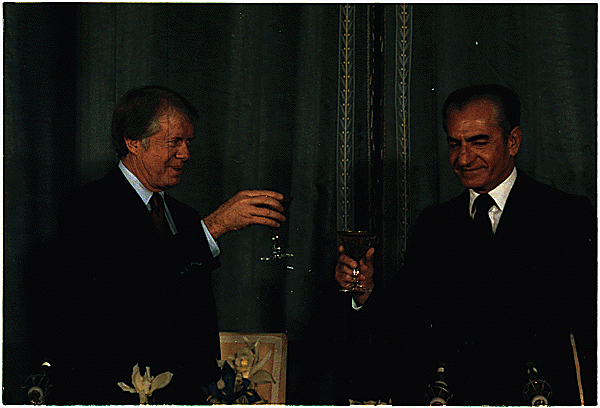
During a go to to Tehran, President Jimmy Carter and Shah Mohamed Reza Pahlavi raised a toast. / National Archives
spark ignites
January 6, 1978
Iranian newspaper Eteraat revealed a front-page editorial disparaging Ruhollah Khomeini, reportedly written by the royal household on the Shah’s route.
January Ninth
Qom’s primary bazaar, dwelling to Iran’s largest seminary, will likely be closed to protest the defamation of Khomeini. Thousands of protesters assault symbols of the monarchy. Security forces killed not less than 5 folks.
February 18th
In accordance with Shia custom, memorial providers will likely be held in cities throughout Iran on the fortieth day after the Qom protester’s demise. A pupil protester was killed in Tabriz, sparking riots and additional violence.
March to May
The cycle of protests, repression, violence and mourning continues in 34 Iranian cities.
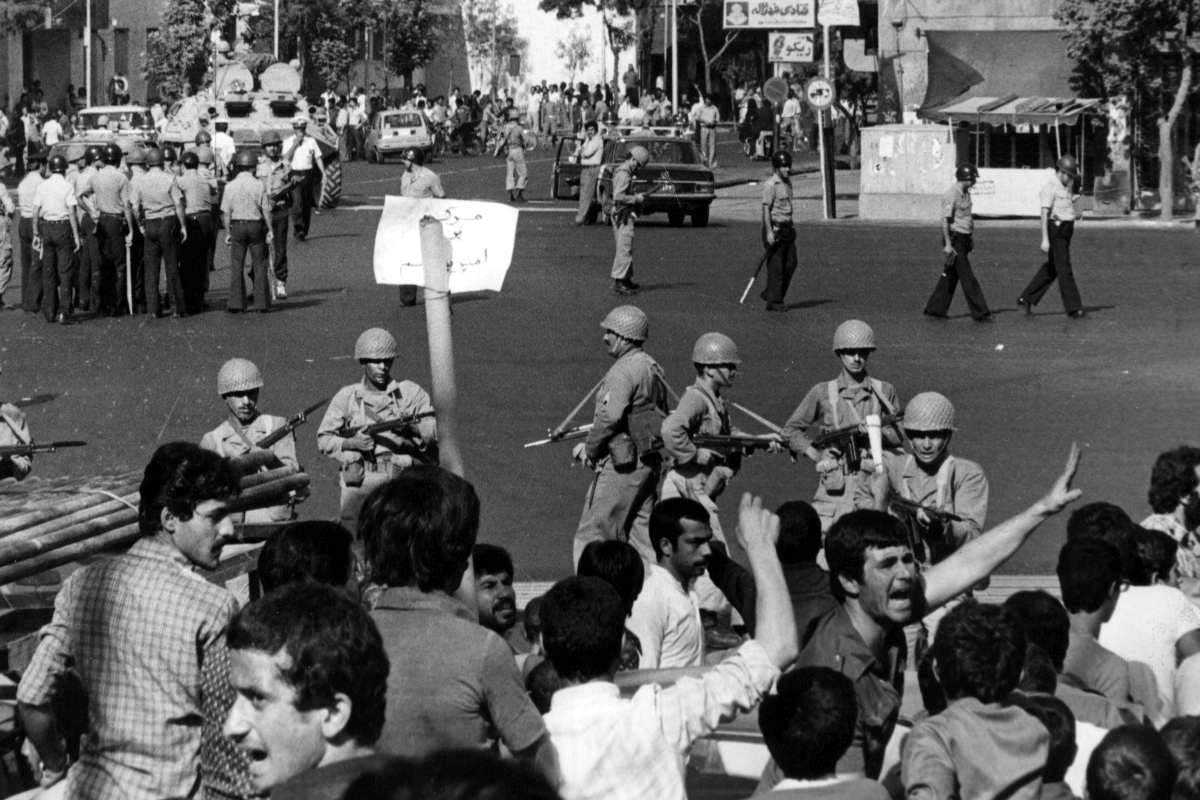
Street demonstrations in 1978. /Wikimedia Commons
June seventh
Shah will substitute SAVAK chief General Nematollah Nassiri. One of the primary actions of his successor was to order the discharge of 300 detained clergymen.
July Twentieth
Protests erupt in Mashhad following the demise of a cleric in a site visitors accident. Many folks died within the unrest there and elsewhere.
August Ninth-Tenth
The arrest of the cleric sparked riots in Isfahan that rapidly unfold to Shiraz, Qazvin, Tabriz, Abadan, and Ahwaz. Shiraz Arts Festival canceled, with an estimated 100 deaths. Martial legislation is asserted in Isfahan.
a revolution breaks out
August Nineteenth
A deliberate arson on the Cinema Rex in Abadan kills 477 Iranians. Opposition events blame SAVAK. After the revolution, the Islamists confessed and have been charged with arson.
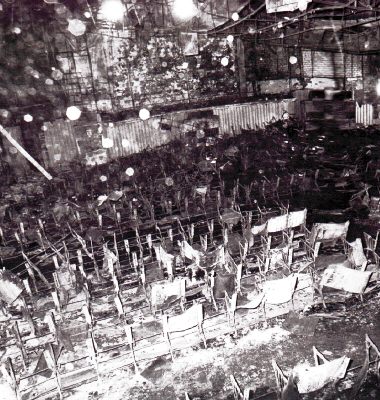
Inside the Cinemarex theater in Abadan after the fireplace. / Wikimedia Commons
August twenty seventh
Prime Minister Jamshid Amouseghal resigns. His successor, Jafar Sharif-Emami, initiated reforms aimed toward pacifying the state of affairs.
September eighth
The morning after the Shah declared martial legislation, safety forces opened hearth on a big protest in Tehran’s Jale Square. At least 100 folks have been killed, and the occasion grew to become generally known as “Black Friday.”
October 3
On the Shah’s orders, the Iraqi authorities expelled Khomeini from the nation. After being denied entry to Kuwait, Khomeini traveled to France and settled in Neufre-le-Château on the outskirts of Paris, the place he advantages from much more media entry and a spotlight.
November sixth
Days after protests escalated in Tehran on the spiritual vacation, makes an attempt to dealer a nationwide unity authorities with opposition forces collapsed due to Khomeini’s defiance. Prime Minister Sharif Emami resigns and is changed by General Gholamreza Azhari. “I’ve heard the voice of your revolution…As the Shah of Iran and because the Iranian folks, I can not assist however approve of your revolution,” the Shah mentioned on state tv, citing previous errors. He broadcast a promise to not repeat the incident and to make amends.
December sixth
Just every week after publicly reaffirming US help and “confidence” within the Shah, President Jimmy Carter publicly sidestepped in a press assertion, saying, “Personally, we consider that the Shah will keep a serious position.” I hope so, however that’s the resolution of the Iranian folks.” make. “
December Tenth-Eleventh
Millions of Iranians are protesting throughout the nation demanding the elimination of the Shah and the return of Ayatollah Khomeini.

A road demonstrator holds up a photograph of Ayatollah Khomeini in Iran in 1978. / Wikimedia Commons
December twenty ninth
The Shah appoints Shapur Bakhtyar as Prime Minister. A longtime nationalist politician and vocal critic of the Shah, he will likely be confirmed by parliament in two weeks.
1979
January twelfth
In Paris, Khomeini established a revolutionary council to coordinate the transition of energy.
vacant interval
January Sixteenth
The Shah and his household go away Iran for Egypt, ostensibly for a “trip.” Upon departure, the Shah tells Prime Minister Bakhtyar, “I entrust Iran to your care and to God’s care.” You can hearken to Shah’s farewell handle right here.
February 1
Khomeini returns to Iran and is welcomed by thousands and thousands of individuals on the streets of Tehran.
February 4th
Khomeini appointed Mehdi Bazargan as prime minister of the interim authorities. Bakhtyar insists he stays the only real professional head of Iran’s authorities.
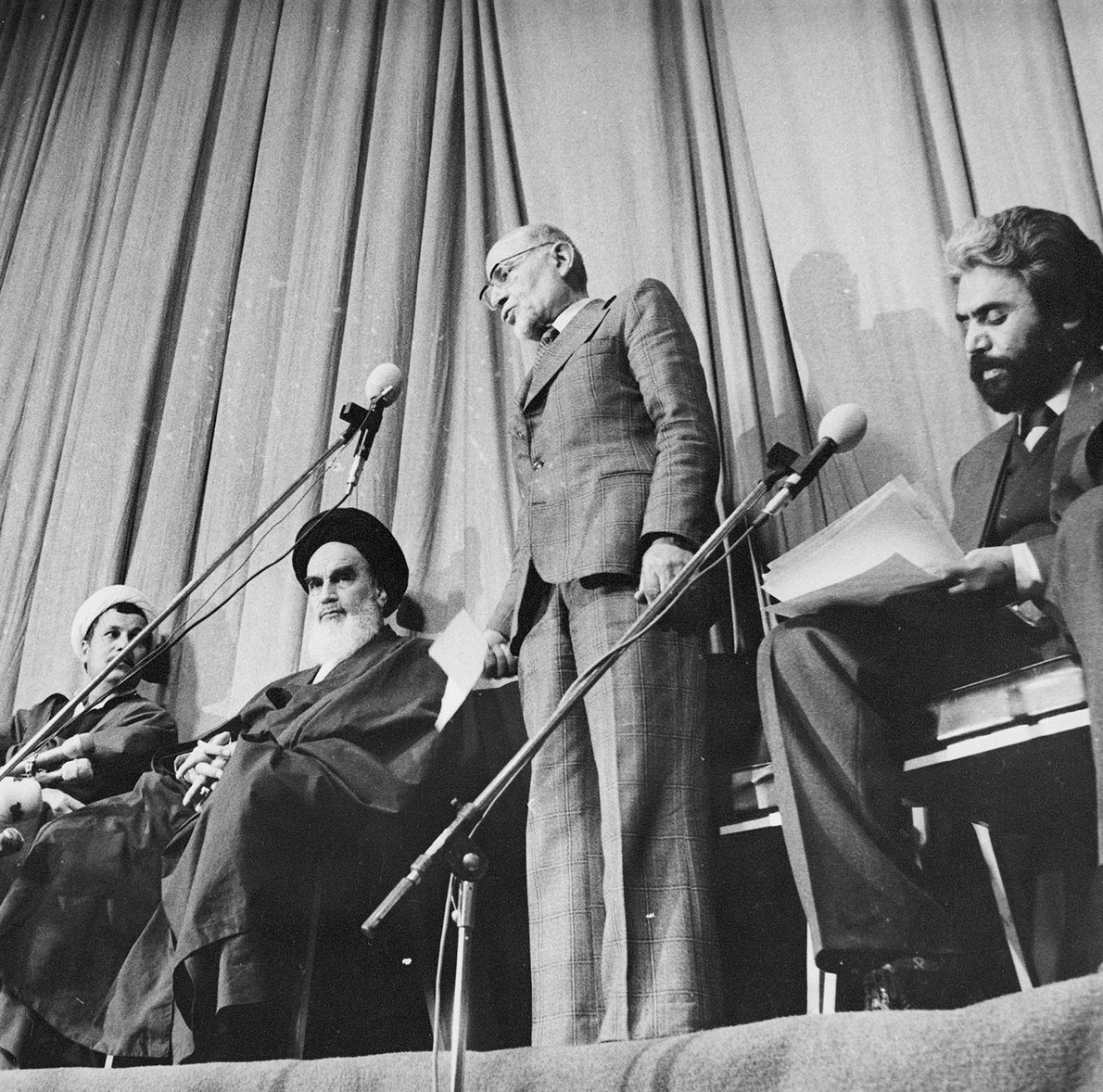
Mehdi Bazargan’s inauguration ceremony within the corridor of Alavi Madrasi on February 4, 1979. /Wikimedia Commons
1979
February 10
President Bakhtyar declares a nationwide curfew and martial legislation. Khomeini ordered his followers to disregard the curfew and stand up in a nationwide revolution.
February Eleventh
The military declares neutrality and the remaining forces of the Shah’s regime collapse. Bakhtiar quickly fled Iran to France, the place he was assassinated by Iranian brokers in 1991.
provisional authorities
February 14
The US embassy in Tehran is attacked by a crowd. Embassy workers initially surrendered, however the demonstrators have been eliminated on orders from Iran’s deputy overseas minister, Ibrahim Yazdi.
March eighth
Tens of hundreds of Iranian girls protested in Tehran on International Women’s Day towards obligatory veiling. (Reference: https://designyoutrust.com/2018/10/rare-photographs-document-iranian-women-protest-against-the-hijab-law-in-march-1979/)
March Thirtieth-Thirty first
Iranians take part in a referendum on whether or not Iran ought to grow to be an “Islamic Republic”. The movement (which didn’t supply any options) acquired near-unanimous help.
May fifth
The Islamic Revolutionary Guard Corps is established by President Khomeini’s decree.
August 3
Iranians vote in nationwide elections for the Council of Experts, a clergy-dominated physique empowered to finalize the draft structure. Voter turnout was considerably decrease than within the March referendum on account of boycotts by leftists, nationalists and a few Islamist teams.
October 14th October twenty second
Shah Mohamed Reza Pahlavi was allowed to enter the United States for medical remedy. Khomeini criticized the United States for permitting the exiled Shah to enter the nation.
hostage incident
November 4th
Student demonstrators occupied the US embassy in Tehran and took embassy workers hostage.
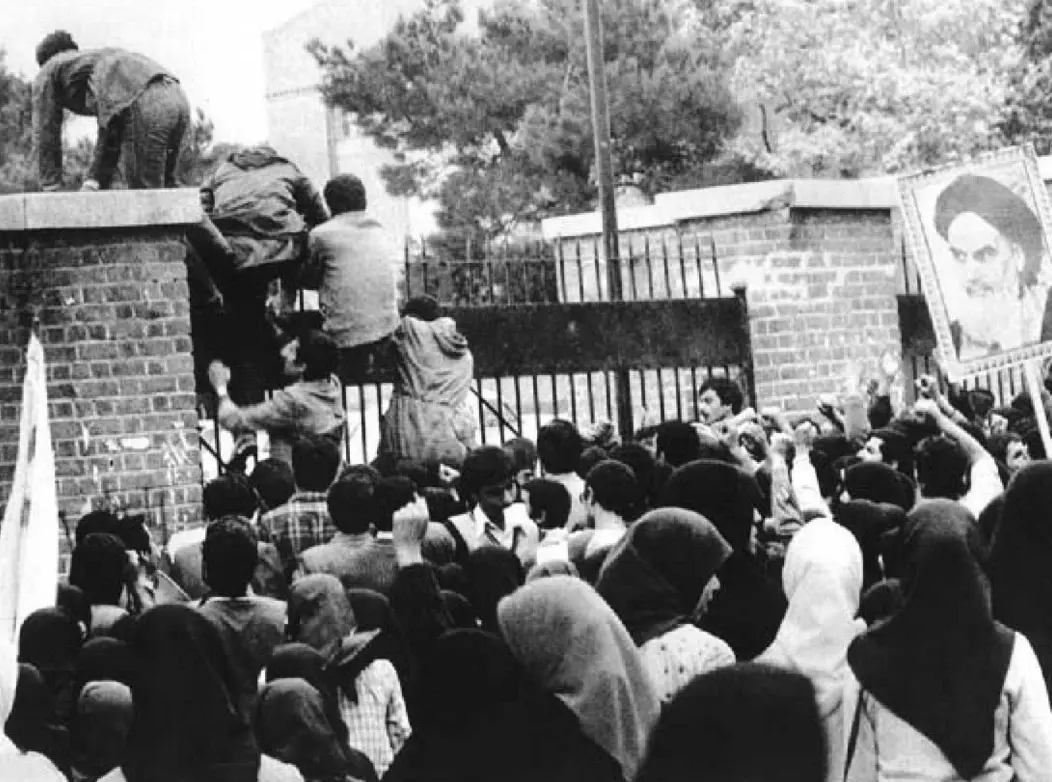
Student demonstrators climb over the gates of the U.S. Embassy in Tehran on November 4, 1979. /Wikimedia Commons
November sixth
November seventh
US President Jimmy Carter despatched a particular envoy to Iran with a private letter to barter the discharge of the hostages, however was refused entry.
November 14th
The United States freezes all property and earnings of the Iranian authorities and the Central Bank of Iran.
November Nineteenth-Twentieth
As a results of Iran’s unilateral declaration of intent, 13 feminine and African American hostages are launched.
December 2nd-Third
Iran’s new structure was accepted overwhelmingly in a referendum with 75% of voters taking part.
December 4th
The United Nations Security Council handed a decision calling on Iran to launch the hostages.
December Fifteenth
Shah leaves the United States and heads to Panama.
1980
January twenty fifth
Abolhassan Bani Sadr is elected as the primary president of the Islamic Republic. Within 18 months he could be impeached and flee the nation.
March 14th
Iranians will vote in parliamentary elections, with a second spherical to be held in May.
April seventh
The United States formally breaks diplomatic relations with Iran.
April twenty fifth
Operation Eagle Claw: An embassy hostage rescue mission fails after a sandstorm crashes a helicopter and kills eight American troopers.
April twenty eighth
Secretary of State Cyrus Vance introduced his resignation and submitted it to President Carter 4 days earlier than the rescue effort started.
July Ninth
July twenty seventh
Shah Mohammed Reza Pahlavi handed away in Cairo, Egypt.
September 12
In his speech, Khomeini outlined the preconditions for the settlement.
September twenty second
Iraq invades Iran, beginning an eight-year battle that has left lots of of hundreds of casualties on either side.
1981
January Twentieth
All remaining American hostages will likely be launched in 444 days after Tehran and Washington signal the Algiers Accords. The deal would unfreeze Iranian property, elevate different U.S. sanctions towards Iran and create a tribunal to adjudicate billions of {dollars} in monetary claims between the 2 international locations.
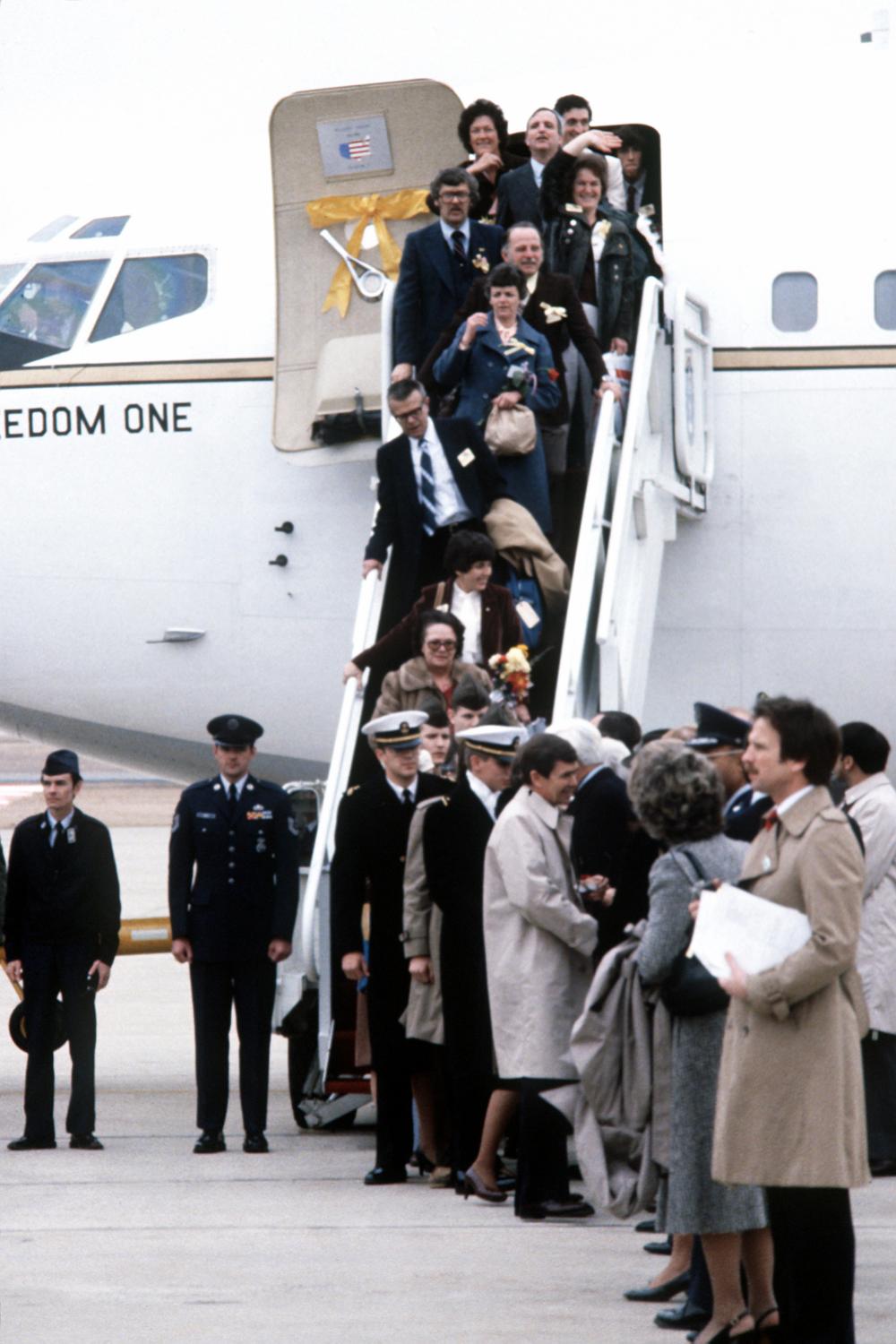
Former Iranian hostages and their households disembark from a airplane upon arrival at Andrews Air Force Base. / National Archives
Source hyperlink

